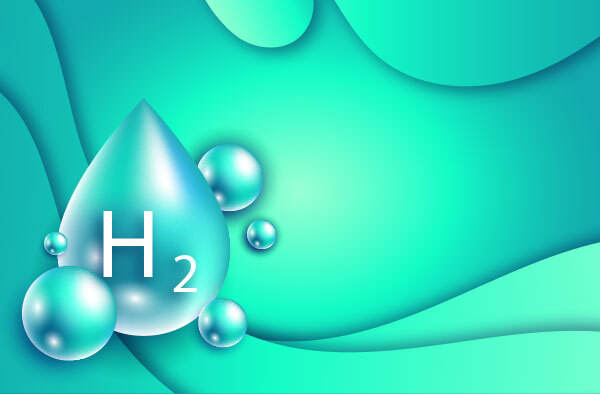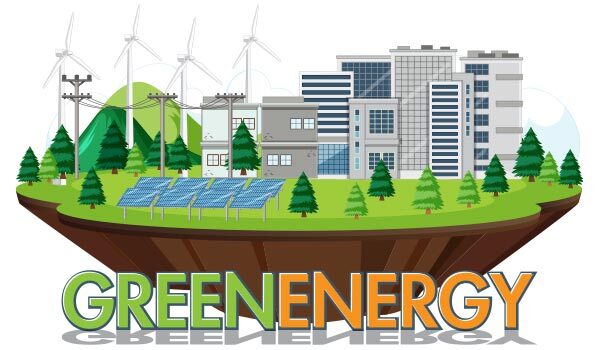
 Data Structure
Data Structure Networking
Networking RDBMS
RDBMS Operating System
Operating System Java
Java MS Excel
MS Excel iOS
iOS HTML
HTML CSS
CSS Android
Android Python
Python C Programming
C Programming C++
C++ C#
C# MongoDB
MongoDB MySQL
MySQL Javascript
Javascript PHP
PHP
- Selected Reading
- UPSC IAS Exams Notes
- Developer's Best Practices
- Questions and Answers
- Effective Resume Writing
- HR Interview Questions
- Computer Glossary
- Who is Who
Green Hydrogen - What it is, Applications and Examples
What is Green Hydrogen?
Green hydrogen is a fuel which can be obtained with the help of electrolysis. The water is electrolyzed with the help of renewable energy sources like wind, or solar power. The aim behind producing green hydrogen is to use it as a fuel. This will help in limiting global warming to 1.5 degrees centigrade. The production of green hydrogen is expensive but will come down in the future.

Types of Hydrogen
Hydrogen is of many types and we will discuss them here in detail ?
1. Green Hydrogen
Green hydrogen can be made by electrolyzing water through renewable energy sources. The water is split by electrolyzers through an electrochemical reaction into hydrogen and oxygen and no carbon dioxide is released in this process.
2. Blue Hydrogen
Natural gas is used to produce blue hydrogen. Steam reforming is the process that is used to produce blue hydrogen. In this process, steam and natural gas are brought together which produces hydrogen and carbon dioxide.
3. Grey Hydrogen
Grey hydrogen is the most common type of hydrogen which is created by using natural gas or methane. Steam methane reformation is the process that is used to make grey hydrogen. No greenhouse gas is formed while making grey hydrogen.
4. Black and Brown Hydrogen
Black and brown hydrogens are created by using coal or lignite. Both of them are dangerous for the environment. Hydrogen that is made from fossil fuels is called black or brown hydrogen. The process of gasification is used for making these hydrogens.
5. Pink Hydrogen
Pink hydrogen is created by electrolyzing water with the help of nuclear energy. This type of hydrogen can also be called purple or red hydrogen. Nuclear reactors generate a lot of high temperatures so other types of hydrogens can be made through gasification or electrolysis.
6. Turquoise Hydrogen
Turquoise hydrogen is a new type of hydrogen which is formed by the methane pyrolysis process. Solid carbon is also produced in this process. In the future, turquoise hydrogen may become a low-cost fuel.
7. Yellow Hydrogen
It is also a new type of hydrogen in which the process of electrolysis is conducted through solar power.
8. White Hydrogen
This is the natural hydrogen which can be found in the underground deposits. The process used to make white hydrogen is called fracking.
9. Gold Hydrogen
Gold hydrogen is made by bacteria fermentation. It is a new type of hydrogen and can be extracted by using carbon dioxide.
How to obtain Green Hydrogen?
Green hydrogen is obtained by electrolyzing water which breaks it into its components which are hydrogen and oxygen. Here is the process of obtaining hydrogen.
1. Usage of Green Electricity
Green electricity can be obtained from water, sun, and wind. Hydroelectricity is green electricity that is used in many parts of the world. There are many hydropower plants that have been made on the natural water resources. The power of water is converted into the electric current.

In the case of wind, the kinetic energy is converted into mechanical energy with the power of wind, and then turbines are used to produce electricity.
2. Usage of Water to produce Green Hydrogen
Electrolysis is the process that is used to produce hydrogen from water. In this process, electricity is passed into the water which breaks it into hydrogen and oxygen. The electricity should be produced from renewable resources to produce green hydrogen.
3. Other processes of obtaining Green Hydrogen
Besides electrolysis, pyrogasification is a process of producing green hydrogen. In this process, organic matter and carbonic wastes are heated. The temperature of this heat should be between 900 and 1200 degree centigrade. A complex gas is formed through this process which consists of hydrogen. Currently, experiments are being conducted to produce green hydrogen using this process.
How does Green Hydrogen work?
Green hydrogen has to be converted into energy. In this process, hydrogen that is stored in different tanks is transferred into a fuel cell. After transferring the hydrogen, it combines with oxygen to produce electricity. No carbon emission is done in this process and only water or water vapor is produced as a by-product.
Applications of Green Hydrogen
There are many applications of green hydrogen and we will discuss them here in detail ?
1. Green hydrogen can be used as a fuel
Green hydrogen can be used as a fuel and soon it will be used in transport. Green hydrogen is being used in some cars. These cars consist of a hydrogen tank which is connected to a fuel cell. The electricity is generated in the fuel cell that provides energy for the engine to move. Fuel cells can be a great option to be used in vehicles in future.
2. Green hydrogen can be used in industry
Currently, there are two industries where green hydrogen is being used. One of these industries is the chemical industry and the other one is the petrochemical industry. In the chemical industry, green hydrogen is used for producing fertilizers and ammonia. Petroleum products are produced in the petrochemical industries with the help of green hydrogen.
3. Green hydrogen can be used for domestic purposes
Many projects and experiments are under process so that natural gas can be replaced with green hydrogen for domestic use. Green hydrogen can be used in households for the production of electricity and heat.
4. Energy storage
Green hydrogen can be used for energy storage. Scientists are in the process of making batteries that can work with the help of renewable energy produced through electrolysis.
Benefits of Green Hydrogen
Green hydrogen has many benefits and some of them are listed below ?
- No harmful gases are emitted during production and combustion
- It can be stored easily and can be used for other purposes
- The gas can be used in different sectors like commercial, transportation, production of electricity, and many more
- Natural resources are used to produce green hydrogen and these resources do not exhaust
- Green hydrogen can be easily transported in tanks
Conclusion
Green hydrogen is a product that is produced by electrolysis of water. The electrolysis is conducted by producing green electricity through renewable energy like wind, water, or solar power. Green hydrogen can be used in transportation, industries, households, and many more. The production and combustion of green hydrogen does not produce harmful gases so experiments are being conducted so that it can be used in place of other types of fuels.
Green Hydrogen FAQs
1. How can energy be extracted from hydrogen?
A large amount of hydrogen is available in nature. Hydrogen is not available freely but in combination with other elements. Different processes have to be used to separate hydrogen from different elements and can be used to generate energy for producing electricity, heat, etc.
2. What is the difference between Green and Grey Hydrogen?
Natural gas is used for the production of grey hydrogen and carbon dioxide is emitted as a by-product. Electrolysis is used in the production of green hydrogen and only water vapor is emitted as a by-product.
3. What is electrolysis?
Electrolysis is a process in which water molecule is split into hydrogen and oxygen by passing the electric current in the water. The water is stored in the electrolyzer and the electricity is passed to split the water molecules. The electrolyzer consists of an anode and a cathode which are covered by an electrolyte. The electric current divides the electrolyte into hydrogen and oxygen atoms.
4. Can we use seawater for the production of green hydrogen?
Yes! Seawater can be used for the production of green hydrogen but the chloride can corrode the electrodes.
5. Is the usage of hydrogen safe?
The production of hydrogen is safe but it has to be handled carefully. Many systems have been developed so that hydrogen can be used safely.

